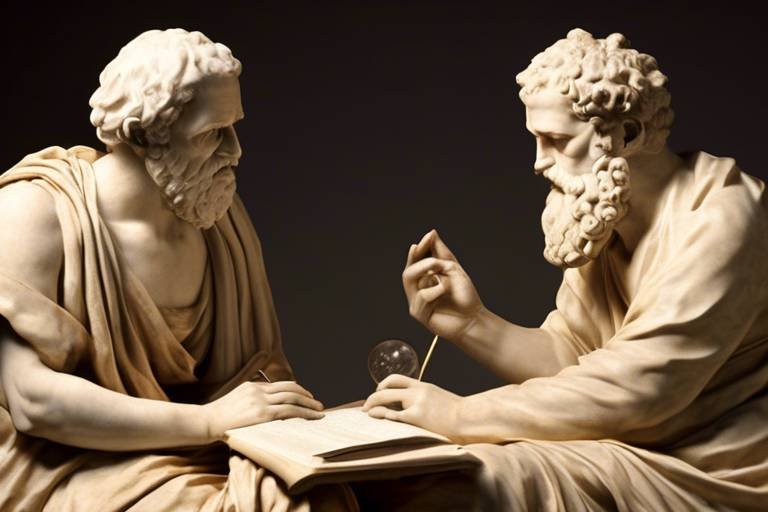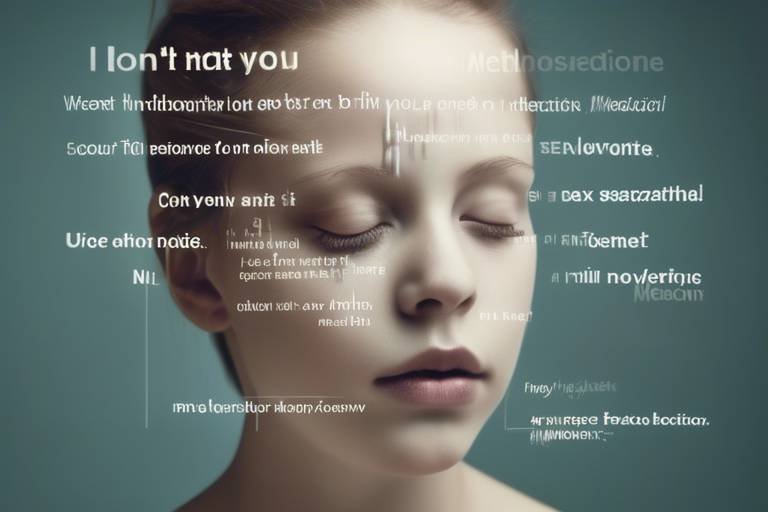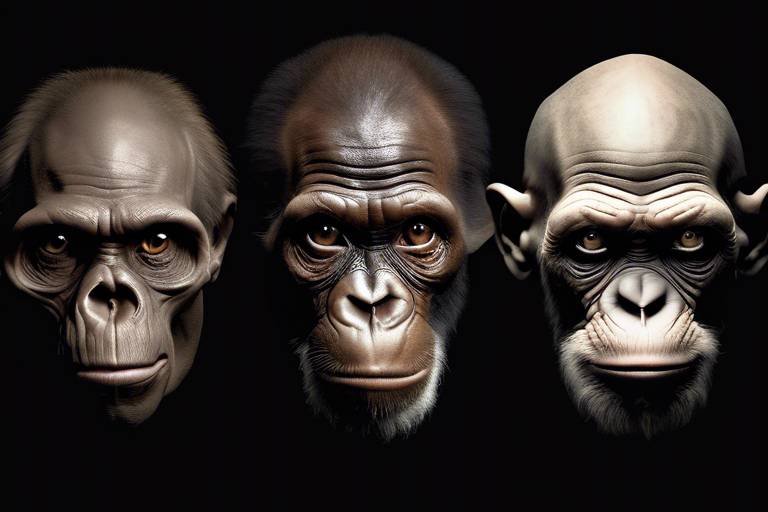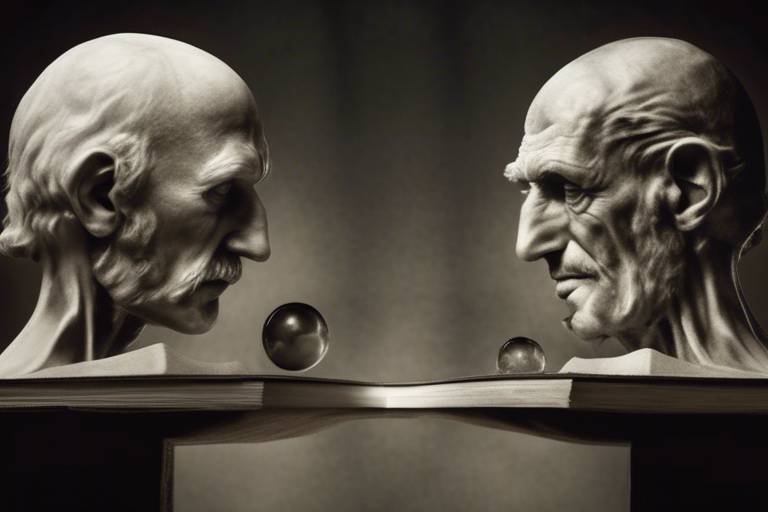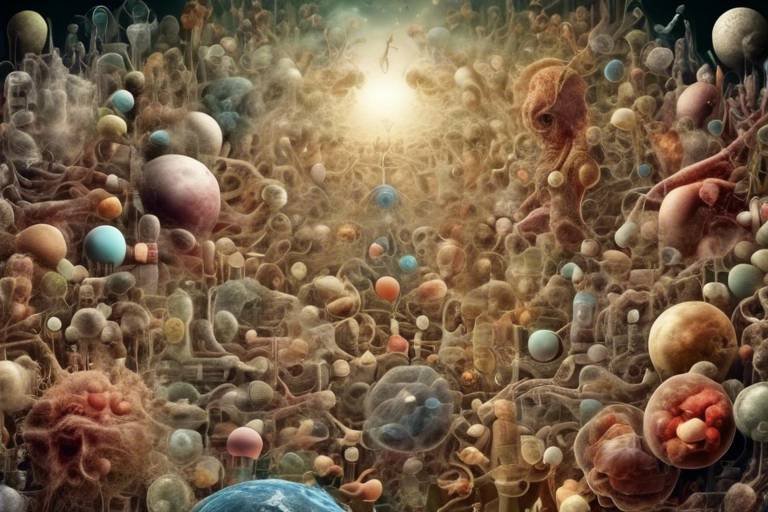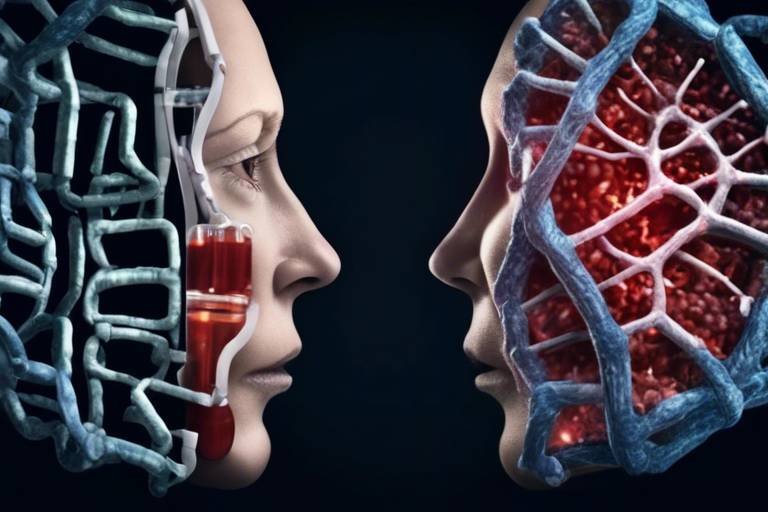Descartes’ Dualism - Its Relevance in Cognitive Sciences
Have you ever pondered the age-old question of what truly makes us human? Is it our thoughts, our emotions, or perhaps the very essence of our being? These inquiries have been at the heart of philosophical debates for centuries, and one of the most influential figures in this discourse is René Descartes. His concept of dualism, which posits a distinct separation between the mind and the body, has not only shaped philosophical thought but has also laid the groundwork for modern cognitive sciences. In this article, we will embark on a journey through the intricate landscape of Cartesian dualism, exploring its implications for understanding consciousness and the mind-body relationship.
At the core of Descartes' philosophy lies the assertion that the mind and body are fundamentally different substances. He famously declared, "Cogito, ergo sum" or "I think, therefore I am," emphasizing that our ability to think is proof of our existence and, more importantly, of a separate thinking substance—our mind. In contrast, the body is perceived as a physical entity governed by the laws of nature. This distinction has profound implications, not only for philosophy but also for the burgeoning field of cognitive science, which seeks to unravel the mysteries of human thought and behavior.
By establishing this dualistic framework, Descartes opened the door for future discussions about the nature of consciousness and the intricate relationship between mental states and physical processes. This framework allows researchers to explore how our thoughts, feelings, and perceptions interact with our physical bodies in ways that are both fascinating and complex.
Now, let’s dive deeper into what is known as the mind-body problem. This issue arises from the apparent disconnect between our mental experiences and physical actions. How can something as intangible as a thought influence a physical action, like raising your hand? This question has puzzled philosophers and scientists alike for centuries. Dualism raises several critical questions:
- What is the nature of the interaction between the mind and the body?
- Can mental states exist independently of physical states?
- How do we account for the subjective experience of consciousness?
Understanding these questions is essential for anyone interested in cognitive science, as they form the foundation for exploring how we perceive reality and interact with the world around us.
To fully appreciate the impact of Cartesian dualism, it’s crucial to consider the historical context in which it emerged. The Enlightenment period was a time of great intellectual awakening, characterized by a shift towards reason and scientific inquiry. During this era, Descartes' ideas provided a counterpoint to the prevailing notions of the time, which often conflated the mind and body. His work challenged the status quo, prompting a reevaluation of how we understand human existence.
Descartes' dualism has significantly influenced contemporary philosophical discourse, igniting debates around consciousness, identity, and the very nature of reality. Philosophers today continue to grapple with the implications of his ideas, questioning how they apply to modern understandings of psychology and human behavior.
The implications of dualism have also shaped scientific inquiry, particularly in fields such as psychology and neuroscience. Researchers have begun to explore the nature of consciousness, seeking to understand how mental phenomena arise from physical processes. This intersection of philosophy and science has led to groundbreaking advancements in our understanding of the human mind.
However, dualism is not without its critics. Various critiques challenge the validity of Descartes' assumptions, arguing that they oversimplify the complexities of human experience. Alternative frameworks, such as physicalism, propose that everything about the mind can be explained in terms of physical processes, thereby negating the need for a separate mental substance. These critiques encourage ongoing dialogue and exploration within cognitive science, pushing the boundaries of our understanding.
Despite the critiques, Cartesian dualism continues to inform research in cognitive science. Its implications are particularly evident in areas such as artificial intelligence and consciousness studies. As we delve into these realms, we find ourselves grappling with questions that Descartes himself might have pondered: Can machines possess consciousness? What does it mean to have a mind?
The development of artificial intelligence raises intriguing questions regarding dualism. If a machine can mimic human thought processes, does it possess a mind? Some argue that consciousness is a uniquely human trait, while others suggest that advanced AI could one day achieve a form of consciousness. This ongoing debate is a testament to the relevance of Descartes' ideas in contemporary discussions about the nature of intelligence.
Moreover, advancements in neuroscience challenge and reinforce dualistic perspectives. As we uncover the relationship between brain activity and conscious experience, we are forced to reevaluate the boundaries between mind and body. Are our thoughts merely the result of neural processes, or is there something more profound at play? These questions continue to fuel research and debate in the field.
- What is Cartesian dualism? Cartesian dualism is the philosophical concept that posits a fundamental distinction between the mind and body.
- How does dualism relate to cognitive science? Dualism influences cognitive science by framing discussions around the nature of consciousness and the mind-body relationship.
- What are some critiques of dualism? Critics argue that dualism oversimplifies human experience and propose alternative frameworks like physicalism.
- Can artificial intelligence possess consciousness? This remains a debated topic; some believe it is possible, while others assert consciousness is uniquely human.

The Foundations of Cartesian Dualism
René Descartes, a towering figure in the realm of philosophy, introduced the concept of dualism in the 17th century, fundamentally reshaping our understanding of the mind and body. At its core, Cartesian dualism posits that the mind and body are two distinct entities that interact yet remain fundamentally different in nature. Descartes famously stated, "Cogito, ergo sum," which translates to "I think, therefore I am." This assertion highlights the primacy of the mind, suggesting that our consciousness and thoughts are what define our existence, separate from the physical body that houses them.
This distinction between the mental and the physical laid the groundwork for future explorations in cognitive science. Descartes categorized the mind as a non-material substance, a realm of thoughts, feelings, and consciousness, while the body was regarded as a tangible, mechanical entity governed by the laws of physics. This separation raises intriguing questions about how these two realms interact. For instance, how can a thought (a mental event) lead to a physical action, such as moving your arm? This inquiry forms the crux of the mind-body problem, which continues to perplex and inspire philosophers and scientists alike.
To better understand Descartes' dualism, let’s consider a few key points:
- Substance Dualism: Descartes argued that the mind is a non-material substance, while the body is a material substance. This means they have different properties and exist independently.
- Interactionism: Despite their differences, Descartes believed that the mind and body could interact. For example, when you decide to lift your hand, your mind sends signals to your body to perform the action.
- Implications for Consciousness: This dualistic view raises essential questions about consciousness. If the mind is separate from the body, what does that say about our conscious experiences and their origins?
Descartes' dualism was revolutionary for its time, as it challenged the prevailing materialistic views of the universe. It suggested that to understand human experience, one must consider both the mental and physical aspects of existence. This philosophical framework has had a lasting impact, influencing not only philosophy but also the burgeoning fields of psychology and neuroscience. As we delve deeper into cognitive sciences, the implications of Descartes' ideas continue to resonate, prompting researchers to explore the intricate relationship between the mind and body.
In summary, the foundations of Cartesian dualism set the stage for ongoing discussions about the nature of consciousness, the mind-body relationship, and the very essence of what it means to be human. As we navigate through the complexities of cognitive science, Descartes’ insights remain a vital part of the conversation, challenging us to consider how our thoughts and physical existence intertwine in the grand tapestry of life.

The Mind-Body Problem
The mind-body problem is one of the most intriguing and perplexing issues in philosophy and cognitive science. At its core, it grapples with the relationship between mental states—our thoughts, feelings, and consciousness—and physical states, which include our bodies and the brain. Imagine trying to solve a mystery where the clues are scattered between two seemingly unrelated realms: the tangible world of atoms and neurons, and the elusive domain of thoughts and emotions. This dualistic perspective, as proposed by René Descartes, raises essential questions: How do our thoughts influence our actions? Can a non-physical mind interact with a physical body? And, if so, how does this interaction occur?
Descartes famously posited that the mind and body are distinct entities, a notion that has sparked centuries of debate. This separation leads us to consider how mental processes can result in physical responses. For instance, when you feel anxious about an upcoming event, your heart races and your palms sweat. Here we see a direct correlation between a mental state (anxiety) and a physical response (sweating). But what is happening in that moment? Are these two realms communicating in some way, or are they merely parallel processes that do not interfere with one another?
To further understand this problem, let’s break down the fundamental questions that arise:
- Interaction: How does the mind influence the body? This question probes the mechanisms through which thoughts can lead to physical actions.
- Substance Dualism vs. Property Dualism: Is the mind a separate substance from the body (substance dualism), or is it merely a property of the brain (property dualism)?
- Neuroscientific Insights: How do advancements in neuroscience inform or challenge dualistic views? Are our mental experiences merely the byproducts of brain activity?
Throughout history, various philosophers have attempted to address these questions, leading to a rich tapestry of theories and counter-theories. For instance, some have proposed physicalism, which argues that everything about the mind can be explained in terms of physical processes. Others advocate for idealism, suggesting that reality is fundamentally mental. Each perspective brings its own set of implications for understanding consciousness and the self.
The mind-body problem is not just a theoretical exercise; it has real-world implications. For example, consider the field of psychology. Therapists often focus on the interplay between thoughts and behaviors, aiming to help individuals modify their mental frameworks to influence their physical well-being. This therapeutic approach underscores the importance of understanding how our mental states can manifest in physical symptoms and vice versa.
Moreover, the mind-body problem has implications for artificial intelligence (AI) and robotics. As we develop machines that can mimic human behavior, the question arises: Can these machines possess a mind? If we accept Cartesian dualism, the answer may lean towards skepticism—machines, after all, lack the non-physical aspect of consciousness that Descartes emphasized. However, if we adopt a more integrated view of mind and body, the potential for AI to achieve a form of consciousness becomes a fascinating area of exploration.
In conclusion, the mind-body problem remains a central theme in both philosophy and cognitive science. It challenges our understanding of what it means to be human and how we interact with the world around us. As we continue to explore this complex relationship, we may uncover deeper insights into the nature of consciousness, identity, and even reality itself.
- What is the mind-body problem? The mind-body problem revolves around understanding the relationship between mental states and physical states.
- Who proposed dualism? René Descartes is credited with introducing the concept of dualism, distinguishing between the mind and the body.
- How does the mind-body problem affect psychology? It influences therapeutic practices by highlighting the connection between mental and physical health.
- Can artificial intelligence have a mind? This question is debated, with perspectives varying based on interpretations of dualism and consciousness.

Historical Context of Dualism
To truly grasp the significance of Cartesian dualism, we must first travel back to the 17th century, a time when the world was on the brink of modernity. René Descartes, often heralded as the father of modern philosophy, introduced a revolutionary way of thinking that dissected the human experience into two distinct realms: the mind and the body. This was no small feat, considering that prior to Descartes, most philosophical thought was steeped in a more holistic view of existence.
Descartes' famous declaration, "I think, therefore I am," encapsulated his belief in the primacy of the mind. He argued that while the body is subject to the physical laws of nature, the mind operates in a separate domain, capable of reasoning and reflection. This notion was groundbreaking, as it laid the groundwork for a new understanding of human consciousness and existence, prompting a shift in how we perceive our own reality.
During the Enlightenment, a period characterized by an explosion of scientific inquiry and philosophical exploration, Descartes' dualism sparked intense debates. Thinkers began to question the relationship between the mind and the body, leading to what is now known as the mind-body problem. This philosophical dilemma asks: How can a non-physical mind interact with a physical body? It’s a question that continues to perplex scholars and scientists today.
Moreover, Descartes' dualism did not exist in a vacuum. It was influenced by the scientific advancements of the time, such as the works of Galileo and Newton, which emphasized observation and reason. These developments encouraged a more analytical approach to understanding human nature. The dualistic framework provided a platform for subsequent philosophers, such as Spinoza and Leibniz, to either build upon or challenge Descartes' ideas, creating a rich tapestry of philosophical discourse.
In summary, the historical context surrounding Cartesian dualism is essential for understanding its profound impact on both philosophy and science. It opened the floodgates for discussions about consciousness, identity, and reality, setting the stage for future explorations in cognitive science. As we delve deeper into the implications of dualism, we can appreciate how this 17th-century framework continues to resonate in contemporary thought.
- What is Cartesian dualism? Cartesian dualism is a philosophical concept introduced by René Descartes that posits the existence of two distinct substances: the mind and the body.
- How did Cartesian dualism influence modern philosophy? Descartes' ideas prompted debates on consciousness, identity, and the nature of reality, significantly shaping contemporary philosophical discourse.
- What is the mind-body problem? The mind-body problem explores the relationship and interaction between mental states and physical processes, raising questions about how the two realms influence each other.

Influence on Modern Philosophy
René Descartes’ dualism has left an indelible mark on modern philosophy, shaping the way we approach questions of consciousness, identity, and the nature of reality. His assertion that the mind and body are distinct entities has sparked countless debates, pushing philosophers to delve deeper into the intricacies of human experience. This mind-body dichotomy challenges us to consider not just what it means to think, but what it means to exist as conscious beings. How do our thoughts and emotions interact with our physical bodies? This question remains at the forefront of philosophical inquiry.
Descartes’ famous dictum, “Cogito, ergo sum” (I think, therefore I am), highlights the primacy of thought in establishing existence. This idea has influenced modern philosophers like Immanuel Kant and David Hume, who grappled with the implications of consciousness and self-awareness. Kant, for instance, took Descartes' ideas further by proposing that our perceptions shape our understanding of reality, suggesting a more intricate relationship between mind and world than Descartes initially entertained.
Moreover, the dualistic framework has prompted discussions around the nature of personal identity. Philosophers such as John Locke have expanded on Descartes’ ideas, arguing that consciousness is not only about thinking but also about memory and continuity. This perspective raises intriguing questions: If our memories define our identity, what happens when we forget? Are we still the same person? These inquiries highlight the complexities that arise when we try to reconcile dualism with the fluidity of human experience.
In contemporary discourse, Descartes’ dualism is often juxtaposed with materialism and physicalism, which assert that everything about the mind can be explained through physical processes. This clash of ideas has fueled a vibrant philosophical landscape where thinkers debate the merits and drawbacks of each perspective. For instance, while dualism allows for a rich exploration of consciousness, critics argue that it fails to provide a satisfactory explanation for how the mind and body interact—a conundrum famously known as the interaction problem.
Despite these critiques, the influence of Cartesian dualism persists in modern philosophy. It has paved the way for emerging fields such as neurophilosophy, which seeks to bridge the gap between neuroscience and philosophical inquiry. By examining how brain processes relate to mental states, philosophers and scientists alike are working to unravel the mysteries of consciousness, echoing Descartes’ quest for understanding.
In summary, Descartes’ dualism has not only shaped philosophical thought but has also ignited a flame of inquiry that continues to burn brightly today. As we navigate the complexities of the mind-body relationship, we are reminded of the profound questions that Descartes posed centuries ago, questions that remain relevant as we seek to understand what it truly means to be human.
- What is Cartesian dualism? Cartesian dualism is the philosophical concept introduced by René Descartes that posits the mind and body as two distinct entities that interact with each other.
- How has dualism influenced modern philosophy? Dualism has shaped discussions about consciousness, identity, and the nature of reality, prompting debates among contemporary philosophers.
- What are the critiques of dualism? Critics argue that dualism does not adequately explain the interaction between the mind and body and propose alternative frameworks like materialism.
- How does dualism relate to neuroscience? Dualism raises questions about how mental states can arise from physical processes, leading to explorations in neurophilosophy.

Impact on Scientific Thought
René Descartes' dualism has had a profound impact on scientific thought, particularly in the realms of psychology and neuroscience. By proposing a clear distinction between the mind and the body, Descartes set the stage for a myriad of inquiries into the nature of consciousness and the mechanisms underlying human behavior. This philosophical framework prompted scientists and philosophers alike to grapple with questions about how mental states can influence physical actions and vice versa. The implications of dualism have sparked debates that continue to resonate in contemporary discussions about the mind-body relationship.
One of the most significant contributions of Cartesian dualism is its role in shaping the field of psychology. Early psychologists sought to understand the intricacies of human thought and behavior, often drawing on Descartes' ideas to explore the interplay between mental processes and physical responses. For instance, the concept of cognitive dissonance—the mental discomfort experienced when holding conflicting beliefs—can be traced back to dualistic thinking. This highlights how our mental states can profoundly affect our physical actions, leading to a deeper understanding of human motivation and decision-making.
Furthermore, Descartes' dualism has influenced the development of neuroscience. As advancements in brain imaging and neurobiology have unfolded, researchers are increasingly tasked with reconciling the physical workings of the brain with the subjective experience of consciousness. The challenge lies in addressing how brain activity correlates with mental states, a question that echoes the dualistic divide. In fact, many neuroscientists today are investigating the neural correlates of consciousness (NCC), seeking to identify specific brain processes that correspond to conscious experiences.
To illustrate the impact of dualism on scientific thought, consider the following table that summarizes key areas influenced by Cartesian dualism:
| Field | Impact of Dualism |
|---|---|
| Psychology | Exploration of cognitive processes and their influence on behavior. |
| Neuroscience | Study of the brain's role in consciousness and mental states. |
| Philosophy | Debates on the nature of reality, identity, and consciousness. |
| Artificial Intelligence | Questions about machine consciousness and mental states. |
In conclusion, the impact of Descartes' dualism on scientific thought cannot be overstated. It has not only influenced the way we approach psychology and neuroscience but has also prompted profound philosophical inquiries that challenge our understanding of reality and consciousness. As we continue to explore the complexities of the mind-body relationship, Descartes' ideas remain a pivotal reference point in both scientific and philosophical discussions.
- What is Cartesian dualism? Cartesian dualism is a philosophical concept proposed by René Descartes that posits a distinction between the mind and the body, suggesting that they are fundamentally different substances.
- How does dualism influence modern psychology? Dualism has shaped the exploration of cognitive processes and their effects on behavior, leading to a deeper understanding of human motivation and decision-making.
- What role does neuroscience play in the discussion of dualism? Neuroscience examines the relationship between brain activity and consciousness, challenging and reinforcing dualistic perspectives in understanding mental phenomena.
- Can artificial intelligence possess consciousness according to dualism? Dualism raises questions about whether machines can have mental states or consciousness, which is an ongoing debate in the field of artificial intelligence.

Critiques of Dualism
While Descartes' dualism has undoubtedly shaped philosophical and scientific discussions, it has also faced significant criticism. One of the primary critiques revolves around the interaction problem. How can an immaterial mind influence a material body? This question has puzzled philosophers and scientists alike, leading some to argue that dualism creates more problems than it solves. Critics suggest that if the mind and body are fundamentally different substances, then explaining how they interact becomes a daunting challenge.
Another prominent critique comes from the realm of neuroscience. As scientific understanding of the brain has advanced, many researchers argue that mental states are closely tied to physical processes in the brain. For instance, studies have shown that specific brain activities correlate with particular thoughts and feelings. This correlation raises questions about the validity of dualism, as it suggests that our mental experiences may not be as separate from our physical existence as Descartes proposed.
Furthermore, some philosophers advocate for a more unified approach to understanding consciousness and the mind. They argue that dualism oversimplifies the complexities of human experience by dividing it into two distinct categories. This perspective is often referred to as monism, which posits that everything, including mind and body, is part of a single substance or reality. Monists argue that a more integrated view of consciousness can lead to a better understanding of the human experience.
Additionally, the rise of cognitive science has introduced alternative frameworks that challenge dualistic thinking. For example, the concept of embodied cognition suggests that our thoughts and perceptions are deeply influenced by our physical bodies and environments. This perspective emphasizes the interconnectedness of mind and body, arguing that they cannot be fully understood in isolation from one another.
To summarize, the critiques of dualism can be categorized into several key areas:
- Interaction Problem: The challenge of explaining how a non-physical mind interacts with a physical body.
- Neuroscientific Evidence: Findings that suggest a close relationship between brain activity and mental states.
- Monism vs. Dualism: The argument for a unified understanding of consciousness over a dualistic framework.
- Embodied Cognition: The idea that cognitive processes are deeply rooted in the body's interactions with the environment.
In conclusion, while Descartes' dualism has laid the groundwork for many discussions in philosophy and cognitive science, it is essential to consider these critiques. They not only highlight the limitations of dualism but also encourage the exploration of alternative perspectives that may provide a more comprehensive understanding of the mind-body relationship.
1. What is Cartesian dualism?
Cartesian dualism is a philosophical concept introduced by René Descartes, which posits that the mind and body are two distinct substances that interact with each other.
2. What are the main critiques of dualism?
The main critiques include the interaction problem, neuroscientific evidence linking mental states to brain activity, the argument for monism, and the concept of embodied cognition.
3. How has neuroscience impacted the discussion of dualism?
Neuroscience has provided evidence that mental processes are closely tied to brain activity, challenging the idea that the mind operates independently of the body.
4. What is embodied cognition?
Embodied cognition is a theory suggesting that cognitive processes are influenced by the physical body and its interactions with the environment, emphasizing the connection between mind and body.

Applications in Cognitive Science
The concept of Cartesian dualism, formulated by the brilliant philosopher René Descartes, continues to resonate within the realm of cognitive science today. This philosophical framework, which posits a distinct separation between the mind and the body, has profound implications for various fields, including artificial intelligence, consciousness studies, and neurophilosophy. As we delve into the applications of dualism in cognitive science, it becomes evident that understanding this dichotomy can illuminate the complexities of human thought and behavior.
One of the most intriguing applications of dualism lies in the development of artificial intelligence (AI). As researchers strive to create machines that can mimic human cognitive processes, the question arises: can a machine possess a mind? Dualism suggests that mental states are not merely products of physical processes, but rather exist in a separate realm. This perspective raises critical inquiries about the potential for AI to achieve consciousness. While machines can simulate human-like responses, the essence of what it means to "think" or "feel" remains a topic of heated debate. The philosophical implications are vast, as we ponder whether a computer can ever truly experience emotions or self-awareness.
Moreover, dualism plays a pivotal role in the study of consciousness. Researchers in cognitive science often grapple with the nature of conscious experience, and dualist perspectives offer a framework for exploring this enigmatic phenomenon. For instance, consider the question of subjective experience—how does it feel to be you? Dualism posits that consciousness cannot be fully explained by physical processes alone. This notion encourages scientists to investigate the relationship between brain activity and conscious experience, leading to innovative research methodologies that blend philosophy and empirical science.
In the realm of neurophilosophy, dualism sparks discussions about the relationship between the brain and the mind. As advancements in neuroscience unveil the intricate workings of the brain, questions about the nature of mental phenomena persist. Is consciousness merely a byproduct of neural activity, or does it exist as an independent entity? This ongoing dialogue challenges researchers to consider how dualist principles can inform our understanding of mental disorders, cognitive functions, and the overall human experience.
To illustrate the intersection of dualism and cognitive science, consider the following table highlighting key areas of application:
| Area of Application | Description |
|---|---|
| Artificial Intelligence | Explores the potential for machines to possess consciousness and mental states. |
| Consciousness Studies | Investigates the nature of subjective experience and its relationship to brain activity. |
| Neurophilosophy | Examines the implications of brain research on our understanding of the mind-body relationship. |
In summary, the applications of Cartesian dualism in cognitive science are both profound and multifaceted. By bridging philosophy and empirical research, dualism provides a framework for addressing some of the most pressing questions about the mind, consciousness, and the nature of existence. As we continue to explore these themes, it is crucial to maintain an open dialogue that considers both the philosophical implications and the scientific advancements that shape our understanding of cognitive processes.
- What is Cartesian dualism? Cartesian dualism is a philosophical concept that posits a distinction between the mind and the body, suggesting they are fundamentally different substances.
- How does dualism relate to artificial intelligence? Dualism raises questions about whether machines can possess consciousness or mental states, challenging researchers to explore the nature of thought and experience in AI.
- What role does dualism play in consciousness studies? Dualism offers a framework for understanding subjective experience, prompting investigations into how consciousness relates to brain activity.
- How does neurophilosophy connect to dualism? Neurophilosophy examines how advancements in neuroscience inform our understanding of the mind-body relationship, often engaging with dualist ideas.

Dualism and Artificial Intelligence
The intersection of dualism and artificial intelligence (AI) presents a fascinating landscape for exploration. As we delve into the realm of AI, we can't help but ask: can machines truly possess a mind? This question echoes the age-old debates sparked by René Descartes, who famously posited a clear distinction between the mind and the body. In the context of AI, this distinction becomes even more pronounced as we grapple with the notion of consciousness and whether it can exist outside of biological substrates.
To understand the implications of dualism on AI, we must first acknowledge that modern AI systems are primarily based on algorithms and data processing. They mimic certain cognitive functions, such as learning and problem-solving, but do they genuinely "think" in the way humans do? Descartes would argue that without a soul or non-physical essence, these machines cannot achieve true consciousness. This perspective raises critical questions about the nature of intelligence itself. Is it merely a series of computations, or does it require a conscious experience?
Consider the following aspects of dualism in relation to AI:
- Functionalism vs. Dualism: Functionalists argue that mental states are defined by their function rather than their internal makeup. This perspective could suggest that if an AI system performs tasks indistinguishably from a human, it might be considered to have a form of consciousness. In contrast, dualism maintains that there is more to the mind than just its functions.
- The Turing Test: Proposed by Alan Turing, this test assesses a machine's ability to exhibit intelligent behavior equivalent to, or indistinguishable from, that of a human. If a machine passes the Turing Test, does that imply it has achieved a form of consciousness, or is it merely a sophisticated mimicry?
- Ethical Considerations: As we advance in AI development, the ethical implications of creating machines that may one day seem conscious become increasingly pressing. If we accept a dualistic view, we might argue that machines cannot possess rights or moral consideration since they lack a soul.
Moreover, the development of neural networks and deep learning models has sparked debates on whether these systems can achieve a form of consciousness akin to human experience. Some researchers argue that as these systems become more complex, they might approach a state of awareness. However, critics of this view remind us that complexity does not equate to consciousness. They emphasize that the essence of human experience involves subjective awareness, which machines, bound by their programming, may never truly grasp.
In conclusion, the relationship between dualism and artificial intelligence is a complex tapestry woven with philosophical inquiry, ethical dilemmas, and scientific exploration. As we continue to push the boundaries of AI, we must remain vigilant in our consideration of what it means to be conscious and whether machines can ever transcend their dualistic limitations. The questions we face today will undoubtedly shape the future of technology and our understanding of the mind itself.

Neuroscience and Dualism
As we dive deeper into the fascinating world of neuroscience, the relationship between the brain and consciousness becomes increasingly complex. Dualism, as proposed by Descartes, posits that the mind and body are distinct entities. But how does this age-old philosophy hold up against the cutting-edge discoveries in neuroscience? The answer lies in the intricate dance between brain activity and our conscious experiences.
Neuroscience has made significant strides in understanding how our brains function, and it has begun to unravel the mysteries of consciousness. However, this journey often raises more questions than it answers. For instance, if our thoughts, feelings, and perceptions arise from physical processes in the brain, what does that mean for the dualistic view that separates mind from body?
One of the key areas where neuroscience and dualism intersect is in the study of brain activity. Researchers have employed advanced imaging techniques, such as functional MRI (fMRI), to observe brain activity in real-time. These studies reveal that specific thoughts and emotions correspond with particular patterns of brain activity. This correlation seems to challenge the dualistic notion that mental states exist independently of physical states. Yet, it does not entirely negate the possibility of dualism; instead, it invites a more nuanced understanding of the relationship between the two.
Consider the following table that summarizes some of the key findings in neuroscience that relate to dualism:
| Neuroscience Findings | Implications for Dualism |
|---|---|
| Brain imaging shows specific areas activated during emotional experiences. | Suggests a physical basis for emotions, challenging strict dualism. |
| Neurotransmitters influence mood and cognition. | Indicates a biochemical connection between mental states and brain function. |
| Patients with brain damage exhibit changes in personality and behavior. | Points to the brain's role in shaping the mind, complicating dualistic views. |
These findings lead us to ponder: can we truly separate the mind from the brain? Or are they two sides of the same coin? While dualism offers a compelling framework for understanding consciousness, neuroscience pushes us to reconsider the boundaries between mental and physical phenomena.
Moreover, the advancements in neuroscience have sparked debates surrounding the concept of artificial intelligence (AI). If machines can replicate human-like behavior, does this imply that they possess some form of consciousness? This question echoes the dualistic dilemma: can a non-biological entity experience mental states akin to humans? As researchers explore these possibilities, the lines between mind and machine blur, further complicating the dualistic perspective.
In conclusion, the relationship between neuroscience and dualism is a dynamic and evolving discourse. While neuroscience provides compelling evidence that challenges strict dualism, it also opens the door to new interpretations and understandings of consciousness. As we continue to explore the depths of the human mind, we must remain open to the possibility that the answers may not fit neatly into the boxes of traditional philosophical frameworks.
- What is dualism? Dualism is the philosophical concept that the mind and body are distinct and separate entities.
- How does neuroscience challenge dualism? Neuroscience shows that mental states often correlate with brain activity, suggesting a physical basis for consciousness.
- Can artificial intelligence possess consciousness? This remains a debated topic; some argue that AI can mimic human behavior but lacks genuine consciousness.
- What are the implications of dualism for understanding consciousness? Dualism invites us to consider the mind's nature, but neuroscience challenges us to explore the physical aspects of consciousness.
Frequently Asked Questions
-
What is Descartes' dualism?
Descartes' dualism is a philosophical concept that posits a distinction between the mind and the body. It suggests that the mind is a non-physical substance, while the body is a physical entity. This framework has laid the groundwork for many discussions in cognitive science, particularly regarding the nature of consciousness and the mind-body relationship.
-
How does dualism relate to the mind-body problem?
The mind-body problem addresses the challenge of understanding how mental states (thoughts, feelings) interact with physical processes (brain activity, bodily functions). Dualism complicates this issue by asserting that the mind and body are fundamentally different substances, leading to questions about how they can affect each other.
-
What historical context is important for understanding dualism?
Understanding the historical context of Cartesian dualism is crucial, especially during the Enlightenment period when philosophical and scientific inquiries began to flourish. Descartes' ideas were revolutionary, prompting new ways of thinking about identity, consciousness, and reality, which have shaped both philosophy and science.
-
How has Descartes' dualism influenced modern philosophy?
Descartes' dualism has significantly impacted contemporary philosophical discourse, sparking debates on consciousness and identity. His ideas encourage ongoing discussions about the nature of reality and the existence of the self, influencing various philosophical movements and theories.
-
What impact does dualism have on scientific thought?
The implications of dualism have shaped scientific inquiry, especially in psychology and neuroscience. Researchers explore how mental phenomena relate to brain activity and consciousness, often grappling with dualistic perspectives as they seek to understand the complexities of human experience.
-
What are some critiques of dualism?
Critiques of dualism challenge its validity by questioning its assumptions and proposing alternative frameworks, such as physicalism. These critiques argue that dualism fails to adequately explain the complexities of human experience and consciousness, leading to ongoing debates in philosophy and science.
-
How does dualism apply to cognitive science?
Cartesian dualism continues to inform research in cognitive science, particularly in areas like artificial intelligence and consciousness studies. It raises questions about whether machines can possess mental states and how consciousness emerges from physical processes.
-
What are the implications of dualism for artificial intelligence?
The implications of dualism for artificial intelligence involve exploring whether machines can achieve consciousness or mental states similar to humans. This raises ethical questions about the nature of intelligence and the potential for machines to experience thoughts and feelings.
-
How does neuroscience challenge or reinforce dualism?
Advancements in neuroscience often challenge dualistic perspectives by demonstrating the close relationship between brain activity and conscious experience. However, some argue that these findings can still coexist with dualistic views, prompting further investigation into the mind-body connection.


